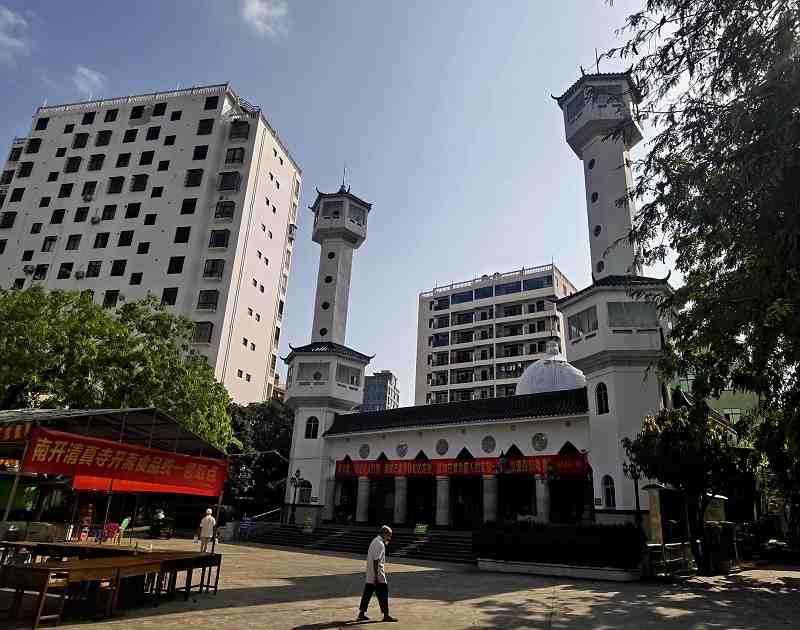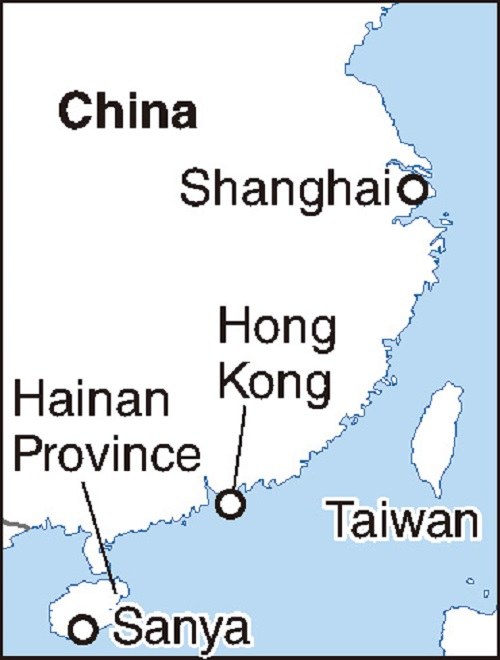
A mosque is seen with the crescent removed from a minaret in Sanya, Hainan Province, China.
11:46 JST, April 24, 2021

SANYA, China – As China’s government steps up its assimilation policy targeting the Uighur ethnic minority in the Xinjiang Uyghur Autonomous Region, the Hui people, a Muslim ethnic minority in southern Hainan Province, are also coming under mounting pressure of Sinicization.
The Boao Forum for Asia, held in Boao in the province, closed on Wednesday with a message about the importance of diversity and openness. However, the Hui residents turned cold eyes toward the less-than-truthful message.
In a working group meeting on religion held that day, representatives from Islamic groups expressed appreciation for the Chinese Communist Party’s policies on religion.
“Islam harmoniously blended in with Chinese culture, and Chinese culture was brought diversity by Islam,” said Tumuniyazi Abudourekefu, vice president of the Islamic Association of China. Abudourekefu also insisted at a press conference on Tuesday that the freedom of religious beliefs is guaranteed in China, and that Muslims in China are not being persecuted.
But the reality is somewhat different. In the seaside resort city of Sanya, about 190 kilometers southwest of the forum venue, members of the Hui minority complained that their faith is being oppressed.
About 8,000 Hui people live in Sanya, but local authorities take a hard line against mosques. They have ordered mosques to remove crescents – a symbol of Islam – from the top of the minarets. There is a mosque that had a crescent forcibly removed by authorities.
“All that forum talk about just means obeying what the authorities say,” sighed a man who came to the mosque to worship.
According to residents in Sanya, renovations at one mosque were held up for about two years because the authorities took their time issuing an approval for the work. Restaurants in the city are also restricted from serving food processed and prepared in accordance with Muslim beliefs. Reportedly, they also cannot include certain words indicating that they serve halal cuisine in their restaurants’ name.
In September 2020, female students were prohibited from wearing traditional headscarves to school. However, a fierce backlash from parents and guardians forced the authorities to retract this order.
“Muslims are the target of a crackdown,” a male resident in his 80s told The Yomiuri Shimbun. “I guess the authorities are worried we could become radicalized, but …”
The administration of Chinese President Xi Jinping is tightening the ruling party’s grip on religion. Sinicization of religion is nothing but making loyalty to the party more important than religious belief. That also is playing out in Sanya.
Top Articles in World
-

Israeli Ambassador to Japan Speaks about Japan’s Role in the Reconstruction of Gaza
-

Videos Plagiarized, Reposted with False Subtitles Claiming ‘Ryukyu Belongs to China’; Anti-China False Information Also Posted in Japan
-

Nepal Bus Crash Kills 19 People, Injures 25 Including One Japanese National
-

Ukrainian Ambassador Closely Watching Japan’s Revision of Defense Export Rules, Hopes for Future Arms Support
-

China, India Tapping into Promising African Market; Beijing Announces Tariff Cuts, Both Countries Aim to Expand Exports
JN ACCESS RANKING
-

Producer Behind Pop Group XG Arrested for Cocaine Possession
-

Japan PM Takaichi’s Cabinet Resigns en Masse
-

Man Infected with Measles Reportedly Dined at Restaurant in Tokyo Station
-

Israeli Ambassador to Japan Speaks about Japan’s Role in the Reconstruction of Gaza
-

Videos Plagiarized, Reposted with False Subtitles Claiming ‘Ryukyu Belongs to China’; Anti-China False Information Also Posted in Japan

























